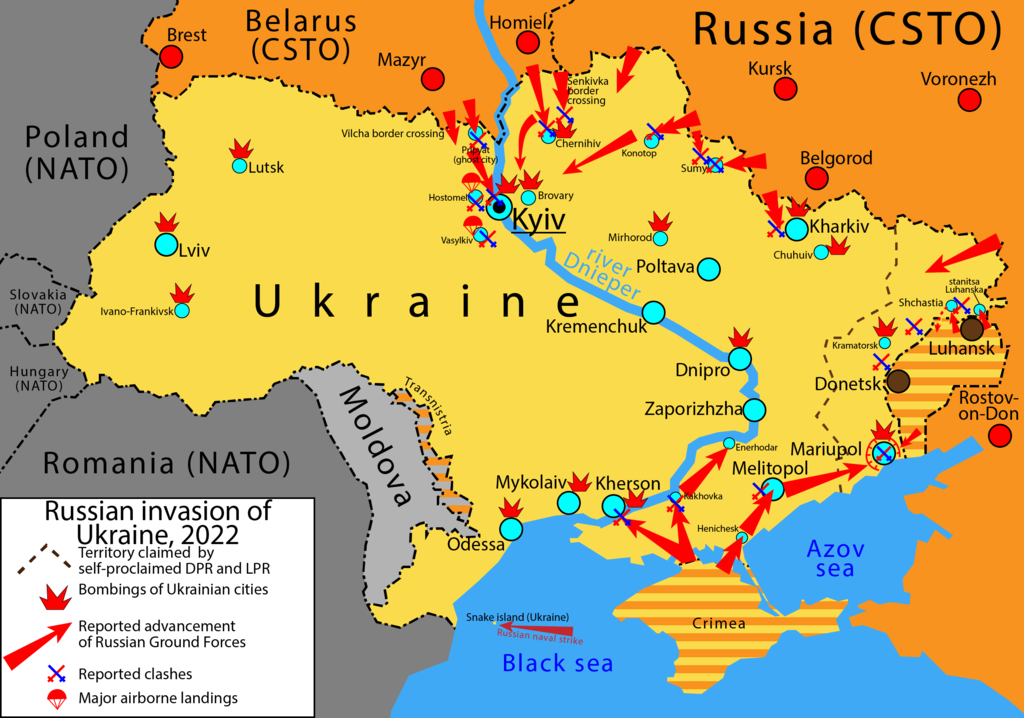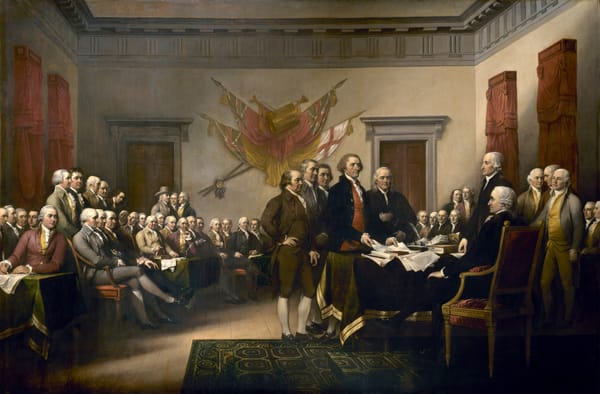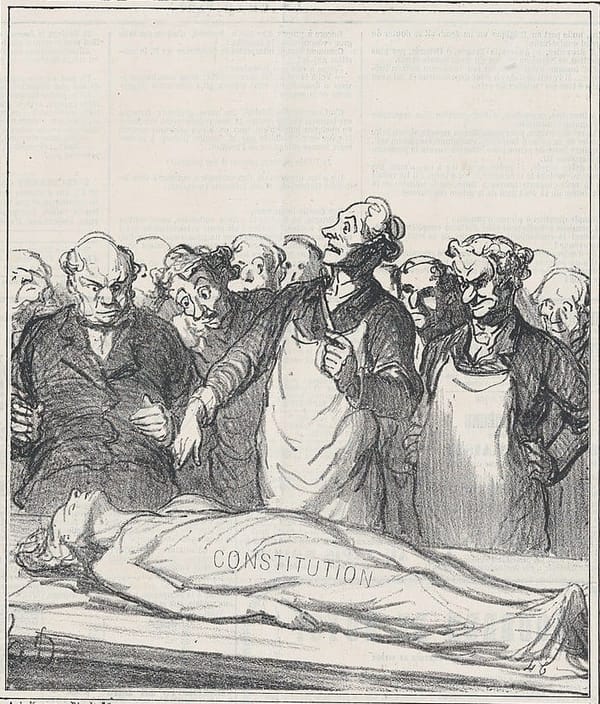A Sober Liberal Internationalism

“Realism and Restraint” as a school of thought is a new player on the US foreign policy stage—though it has older intellectual precursors. In part a response to the perceived interventionist excesses of the aughts, this new school brings a voice of caution to what is traditionally a hawkish foreign policy establishment. With the new conflict in Ukraine, a youtube video by academic John Mearsheimer (before this, hardly a social media influencer) has racked up millions of views, and online twitter fights over IR theory have reached a fever pitch.
There is much to applaud in this new school of thought. Having diverse, and dissenting, alternative views on important questions of war and peace is vital to a functioning liberal democracy. The view it sees itself as a response to has a few descriptors. It is best called liberal interventionism—a Wilsonian perspective that urges military engagement to spread democracy. But it is also seen as the view of neoconservatives and left liberals alike and is ascribed to the “blob”—the semi-permanent foreign policy establishment that lives in DC.
Is realism and restraint a foreign policy stance that liberals can be entirely comfortable adopting? While there is no necessary connection in the nature of the ideas, it is noteworthy that illiberals on the right and left have trended towards a more isolationist foreign policy. This shows up in many forms. In some cases this is grotesque, such as Tucker Carlson’s defense of Putin. More illuminating though is the New York Times op-ed by Sohrab Ahmari, Patrick Deneen, and Gladden Pappin decrying hawks in the GOP. While these authors may sincerely see this as a plea for peace, they also see it as a useful lever against their opponents on the right who are more liberal in domestic spheres (either market liberals or more permissive of social liberalism).
My contention is that liberalism should learn from this school of thought but reject key premises of it that are hostile to liberalism. It should reject the more isolationist tendencies inherent in the position. A liberal foreign policy should also care about liberalism abroad including the regime types of other countries. And it should especially care about the connective tissue of trade and organizations that knit countries together. What liberalism can learn from realism is that power, sadly, does matter, and that the defense and preservation of liberal society must be done in a world in which there are serious constraints and great power rivals. These realizations must temper liberalism’s aspirations as to what is possible, so as to avoid imprudent utopianism.
The lessons of the restraint school
Restraint, as a position of US grand strategy, holds that the US should only consider narrow national interests (territorial integrity) and rely largely on its geographic endowments (no hostile neighbors and two large oceans) to preserve it. In this it should avoid entangling alliances and not seek to go abroad in search of monsters to slay. At its most extreme it would suggest removing the US from alliances like NATO and severely curtailing the number of security guarantees the US provides to other countries, even the liberal democracies..
There is a great deal of wisdom in this approach. First, it requires a considerable and costly military establishment that may have domestic implications (such as expanded intelligence gathering capabilities). Second, it may not actually promote peace abroad as messy within-state conflicts are often opaque and difficult to resolve with foreign intervention. And lastly alliances can open the US to conflicts and moral hazard on the part of reckless junior partners.
These concerns are real. The US spends a considerable amount on defense and it is not always clear that the money is well spent. Some US interventions, like the defense of South Korea, have, with the perspective of many decades, turned out well. But other US interventions do not seem to have, on net, improved the well-being of these countries or even the security of the United States. We should also note that, while the US provided important enabling conditions for South Korea, Japan, and Germany, their present success is due to the efforts of their own citizens. While these three cases were a success, they are not reliable indicators for the wisdom or feasibility of nation-building.
Most challenging for liberal internationalists, because of the importance they place on global interconnectedness and multilateral action, is the critique of alliance structures. The argument is that when there is a large and capable member of the alliance who has shown a willingness to invest considerably in the maintenance of the alliance’s capabilities, then smaller alliance members have incentives to try and “free ride” off of the capabilities provided by the strong member. While many cheer the decision of Germany’s Olaf Scholz in recent days to augment German defense spending in the face of Russian aggression, this largely consists in meeting Germany’s already existing obligations under NATO to spend 2% of GDP on defense. This tendency to “free ride” imposes more costs on the strong member (in this case the US) it also makes the alliance weaker and ill prepared against potential threats.
And it is not always the case that all allies add to US security. Some allies may be willing but are weak with strong hostile neighbors (such as the Baltics). Others may have their own conflicts and disputes that they pursue more aggressively, assuming that the USA will protect them against the bad outcomes of risky decisions (which could see the US drawn into a fight not of our making). Finally, and while this is not of concern to realists it should concern liberals, many of our present allies are not themselves particularly liberal. While it is good to see Erdogan’s Turkey support the territorial integrity of Ukraine, should we be uneasy to have an illiberal regime within NATO? This concern is amplified for illiberal nations with whom we don’t have an alliance agreement, but with whom we are seen as having strong ties—above all Saudi Arabia.
Liberal ends still matter
These are powerful critiques that liberals should take seriously. However, realism also has its own shortcomings. First, it tends to ignore how regime type actually does matter for which countries do or do not affiliate with each other. As we have seen, illiberal regimes don’t always swim together (as is the case with Turkey and Russia today) but liberal democracies generally do. The desire of many in the West to support Ukraine is not simply to erode the relative power of its great power competitor Russia on the world stage, but because Ukraine claims to aspire to become more liberal and more democratic.
A leading realist theorist (though not a restrainer), John Mearsheimer had hoped that Russia could be enlisted in a balancing coalition with the west against a rising China. Yet even before the war in Ukraine it is hard to imagine this being a real possibility. Even apart from the aversion to Putin’s regime on the part of western democracies, Putin’s ideological desire to upend the liberal world orde precluded that as a possibility. While a wartime alliance between western liberals and the USSR did defeat Nazi Germany, the alliance was always very unstable because of ideological differences. This alliance of interest did not long survive the end of the war because of those differences returned to the fore after the defeat of Nazi germany. As a contrast, despite centuries of warfare, France, UK, and Germany seem (compared to historical precedent) harmonious partners within the NATO alliance as liberal democracies.
That regime type matters for which alliances are possible and durable simply seems a matter of fact. It is possible to imagine Russia in alliance with the Western democracies—but not under Russia’s present leadership. A realist could also critique the adding of weak members to the NATO alliance, such as the Baltic states, yet the strong desire to do so surely stems from the fact that they are liberal democracies.
Realists also, following Hobbes, see the world of international relations as fundamentally anarchy. There is no overarching sovereign to enforce global rules against states with the desire and capability to break them. Further, any institutions designed to craft and enforce such rules are only as strong as the will of the strangers members of those institutions. Thus, realists are not surprised at all to see that the UN cannot take any effective action against Russia… as Russia, being a strong member, opposes it.
Yet we do manage to create liberal institutions that, in the domestic realm, work reasonably well to keep the strong from preying on the weak. And while debates may be had as to how effective these are, or particular failures and shortcomings of these institutions, compared to present existing illiberal states (or the entire history of humanity), this accomplishment is really very remarkable. While it would be naive to think that international multilateral institutions could simply exercise authority independent of their members, or that there was some magic imbued into them simply by virtue of their creation, that is not an argument against their creation and strengthening—only an honest acknowledgement of their potential shortcomings.
We also have to realize that there are international organizations with real heft and weight—even if it is not hard military power. (Just ask a government if they are indifferent to a downgrading in their bond rating!) In addition to the rules and norms governing trade, which allows countries to manage their affairs without resorting to the law of the jungle, there are also commercial and cultural ties that cross over international boundaries.
Large multinational corporations help knit the world together and while Thomas Friedman’s theory of a “McDonald’s Peace” has sadly been proved false, the actions of these companies can have weighty independent power as seen when so many companies have withdrawn from doing business with Russia. Cultural organizations, like sporting leagues or the Eurovision song contest, also meaningfully tie countries together in a web of collaboration and shared identity such that their loss is sorely felt. And the cross cultural power of Hollywood, Bollywood, and South Korea knits the world together, shapes norms, and is not merely an augmentation of the power of the country of origin.
Prescriptions for a sober liberal internationalism
The goal of a sober liberal internationalism then should be to strengthen and defend the global community of liberal democracies in a world in which those democracies are under threat. In doing so it should defend existing democracies rather than using military force to bring about regime change. It should also take great power rivalry from illiberal regimes seriously, and while not seeking conflict, take real steps to balance against it.
Of course there are practical challenges to be addressed. While it may seem obvious that liberal democracies should be defended, who defines what is a liberal democracy in good standing? This is not a theoretical question. Just as Poland is taking in many Ukrainian refugees and is emerging as a key NATO partner in the goal of supporting Ukraine against Russian aggression, the EU is sanctioning Poland for undemocratic tendencies. Most democracies do not live up to what others would take to be the platonic ideal of good governance.
Next, if alliances are to be strong and not just clubs for democracies, then it is important to see that all members carry the appropriate share of the effort to defend the alliance. Practically this means having tough conversations with allies about their contributions to mutual defense and even, in extreme cases, threatening that the benefits of alliance would be withdrawn if partners did not live up to their agreed contributions. In many ways, this may require diplomats to be less diplomatic and offer harsher words when allies adopt strategies or make decisions that expose the entire alliance to greater risk.
We should seek to empower international organizations that are consistent with liberal democracy. To the degree that international organizations can contribute to the rule of law and reduce the degree of anarchy in international affairs this is a laudable goal. That said, in practice, not all international organizations actually contribute to this goal. The UN offers an important forum for global discussion, but given the influence of large illiberal states, it is not an institution that the US should reasonably hope to empower given the role illiberal China and Russia play in that body. A better model is how the EU has created a broadly liberal zone in Europe over the past eight decades—though this process is not without its own very serious tensions, growing pains, and trade offs.
Thus, looser agreements, especially those that are essentially liberal in character, which preserve considerable domestic autonomy are a better fit for the United States. Creating zones for the free flow of goods and labor, participating in institutions that promote international cooperation, and building ties of cultural exchange are ways to connect the liberal and democratic world through ties of mutual benefit.
The final question of course is what stance an interlocking system of alliances of liberal democracies should take towards illiberal authoritarian regimes. Open conflict is costly, often unjust, and just as likely to imperil as preserve liberal democracy. Here, then, realism is likely our best guide. While within a zone of liberal internationalism, conduct can be governed by shared norms and institutions, outside such a zone, lacking such norms, the use and threat of force are very real possibilities. Here deterrence should be deployed when needed and trade pursued if feasible.
Featured Image is War in Ukraine (2022)




